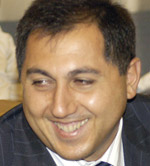At the beginning of the meeting, rector of the Agrarian university Arshaluys Tarverdyan made it clear for everyone that nobody should get the impression that the meeting was organized to make anyone vote “yes” or “no”. “This event was organized in order to show how each person can make a decision based on personal opinions and how to look at the constitutional amendments,” said the rector. Despite this good intention, it was evident that the majority of the people gathered had “already made their decision based on personal opinions” and they were going to vote “yes”. The environment provoked one of the professors present to ask A. Harutyunyan if the opposition wasn’t violating the law by propagandizing the vote for “no”. The rector of the State Management Academy announced that the existing constitution was democratic and had already solved some issues. “Let’s not forget that our country became a member of the European Council thanks to the constitution. If that constitution did not correspond to European norms, Armenia could not be integrated into the European structures with that constitution and its legal field,” he said and added that in 1995, when the constitution was being accepted, the country was changing its regime, the people were faced with psychological problems, the country was in war, etc. and the president of the country was the one who had to play a major role. “Judging from the situation during that time, it is true that the president was the one who was leading the government de facto,” says A. Harutyunyan. The professors of the Agrarian university were mainly interested in finding answers to the questions regarding dual citizenship and powers pertaining to the president. “Dual citizenship is a pretty difficult issue. It has several models. Many people take one model and criticize it. However, there is no written or accepted model here,” said A. Harutyunyan as he discussed the issue concerning dual citizenship. After a couple of minutes, in response to another question, A. Harutyunyan replied that the government had already planned out the dual citizenship scheme. He certified that any state having a Diaspora did not have a ban put on dual citizenship in the political system. In his words, there are issues for which we can find suitable models, but throughout the course of time that model can lose its resource for solving the issue and stop helping to solve the problem. Then it will be necessary to adopt another model. “However, we can’t organize a referendum every time. There are issues which mustn’t need to be regulated through the means of the constitution. They must be regulated by law so that it will be possible to look at the issue more freely judging from the interests of the country,” said Harutyunyan. He brought up some examples for this. In his words, today Russia accepts dual citizenship, however, it wants to get rid of it but can’t because it must first organize a referendum for that and change the constitution. As for Rumania and Hungary, according to A. Harutyunyan, each country has a law about Rumanians and Hungarians living abroad, which “has been passed by the Venetian congress”. What’s interesting is how the abovementioned law differs a Hungarian from, let’s say, a Chinese. A. Harutyunyan could not respond to this question, however, he made it clear that there are norms which we must also take into account. “We have the following problem: maintaining ties with the Diaspora,” this is how he explains the elimination of the dual citizenship ban and goes further by saying: “Wherever we have Diaspora, those countries do not even know about dual citizenship. This means that its practical significance is going to be based on a psychological level,” says A. Harutyunyan. In regard to the National Assembly’s role in changing the country’s boundaries, Harutyunyan stated that today, there is a law which states that the international contracts concerning change of boundaries must be documented by the National Assembly. “Basically, if that law has been passed in order to change boundaries in the future, then we can do that now too,” clarifies the rector as he replied to the worried audience. Harutyunyan also literally said the following during yesterday’s meeting: “We started these constitutional amendments. The European Council was not even informed about them. We have simply asked for their help when we started. The council has made us face responsibility, but they can’t do that because if the constitution did not correspond to democratic norms, then we could not have become a member of the European Council.” He repeated this a couple of times. However, during a meeting with students of the Yerevan State University recently, Robert Kocharyan claimed that the constitutional amendments were part of the prerequisite of the European Council. What is the reason for the discrepancy in the announcements made by both Kocharyan and Harutyunyan? In response to this question, A. Harutyunyan said: “I am not contradicting that announcement. When we started the constitutional amendments and asked the council for its help, we took on the responsibility and signed our name.”

